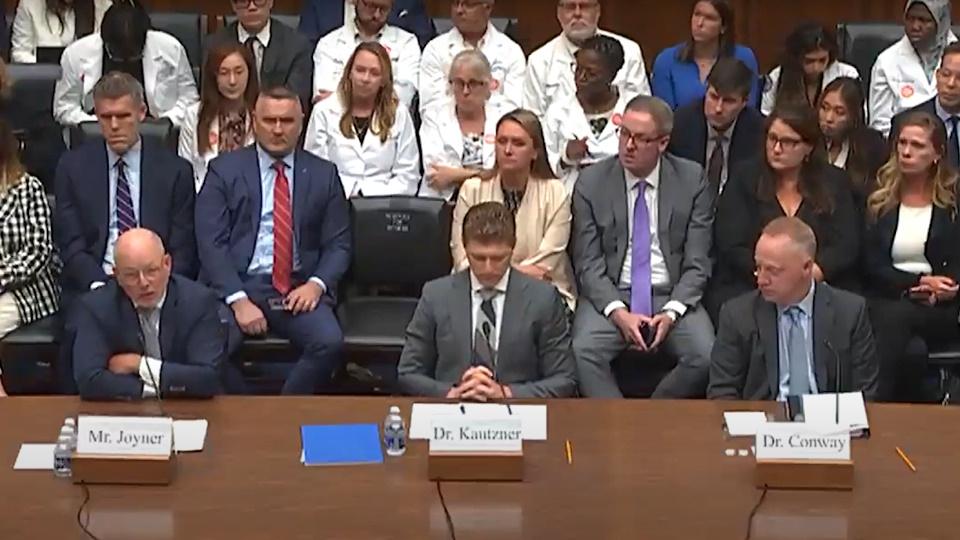PBMs under the cosh at House hearing on drug pricing

CVS Caremark president David Joyner, Express Scripts president Adam Kautzner, and OptimRx chief executive Patrick Conway
The top three pharmacy benefit managers in the US felt the heat at a hearing of the House Oversight Committee, as lawmakers grilled executives over their business practices and accused them of monopolising the supply chain.
The tough questioning was fuelled by a report published ahead of the hearing and prepared by Committee staff, which concluded that the actions of the PBMs, which are responsible for negotiating pharmacy medicine prices with manufacturers, "inflate prescription drug costs and interfere with patient care for their own financial benefit."
Practices highlighted in the report include: steering patients to PBM-owned pharmacies while underpaying competing pharmacies, facilitated by the sharing of patient information and data; gouging independent pharmacies with low reimbursement rates and punitive fees; and forcing pharma manufacturers to pay high rebates to get their drugs on formularies, making it difficult for competing, lower-priced medicines to get access.
The bottom line, it contends, is that "patients are seeing significantly higher costs with fewer choices and worse care."
The top three PBMs – UnitedHealth's OptumRx, CVS Health's CVS Caremark, and Cigna's Express Scripts, who handle more than 80% of US prescriptions – were represented at the hearing by senior management figures, who pushed back against the accusations.
They claim that PBMs pass through to plan sponsors almost all rebates and fees negotiated with drug manufacturers, and say there is no evidence that non-PBM pharmacies are being pushed out of business. Without PBMs to negotiate, they contended, patient pharmacy costs would be much higher.
Adam Kautzner, president of Express Scripts, told lawmakers the company saved its customers $64 billion last year while keeping out-of-pocket costs for patients at $15 per prescription, and insisted the root cause of the problem is manufacturers raising prices on 60% of the products it handles.
Oversight Committee chair James Comer (R-Ky) challenged that statement, saying: "Your companies have constantly claimed that drug companies set market prices, but, if that's the case, why are your companies charging different prices across the country?"
There was a palpable sense of frustration with the PBM representatives, with lawmakers accusing them of refusing to give straight answers to questions on fees levied on independent pharmacies, the reason for pricing disparities across the country, and how PBMs steer patients to pharmacies they own.
Rep Lisa McClain (R-Mich) pressed the executives to provide data on how PBMs benefit the pharmaceutical marketplace and patient care.
"Do you have any data that actually shows PBMs benefit patients? Just show me the data. Can you get that to me Monday or in two years?" she asked. "I have been asking for data and you dive. You want zero transparency and we can see why."
The House committee report treads very similar territory to a Federal Trade Commission (FTC) document published earlier this month that also blamed anticompetitive practices at PBMs for driving up prescription drug costs. It also follows reports that the FTC is planning legal action against the top three PBMs on this issue.
As the House hearing was underway, bipartisan lawmakers introduced a bill called the Pharmacists Fight Back Act, which would increase transparency around some PBM business practices and ban spread pricing - when a PBM reimburses pharmacies one price for a medicine, but charges a health plan another.
The bipartisan bill – sponsored by Reps Jake Auchincloss (D-MA) and Diana Harshbarger (R-TN) - addresses prescription drug coverage in Medicare and Medicaid plans, as well as the Federal Employee Health Benefits programme.
Earlier this year, the House Oversight Committee passed the Delinking Revenue from Unfair Gouging (DRUG) Act (HR 6283), which Comer said would reign in abusive practices by some PBMs that offer plans under Federal Employee Health Benefits programmes. That also includes prohibitions on spread pricing and patient steering.












